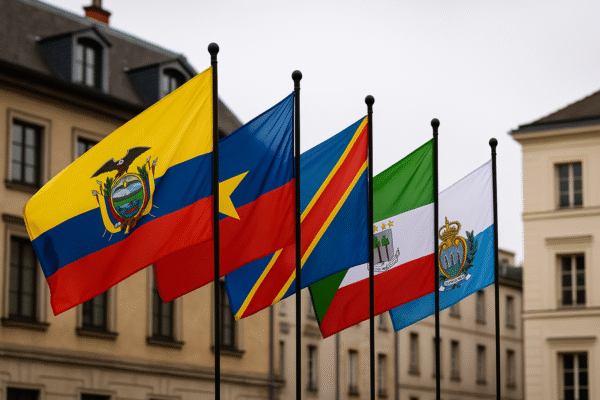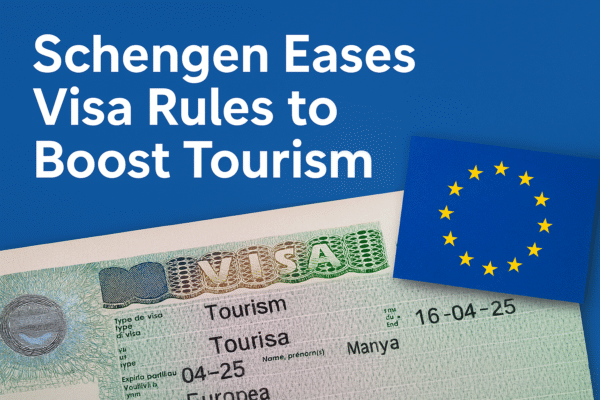Europe Opens Its Doors: Schengen Area Revamps Visa Policy to Revitalize Tourism
In a groundbreaking move to reposition Europe as a premier global tourism destination, Schengen countries have relaxed visa rules to facilitate long-term, multi-entry access for citizens from key markets including India, Turkey, and 13 other partner nations. The 2025 reforms are already making waves, with visa applications rising 13.6% and visitor arrivals up 18% across Europe in the first half of the year, according to data from the European Commission and European Travel Commission.
This new policy framework aligns with the EU’s post-pandemic tourism revival strategy, placing the emphasis on flexibility, speed, and accessibility. The goal is clear: make Schengen more competitive against international destinations like the US, UK, and Southeast Asia by ensuring smoother travel experiences and broader access for repeat visitors.
Visa Demand Soars in 2025: India and Turkey Lead the Surge
The Schengen visa system processed more than 9.7 million applications in 2024 — a 14.1% increase year-over-year. Of these, over 50% were for multiple-entry visas, highlighting traveler preference for repeat and extended visits.
India and Turkey are the two most notable beneficiaries of this reform:
- India: Now eligible for the EU’s “cascade visa” system, Indian applicants with a positive travel history can obtain 2- or 5-year multiple-entry Schengen visas. In 2024, Indian applications exceeded 1.1 million — up 14.6% — despite a rejection tally of over 165,000. The relaxation builds on India’s growing outbound travel market, with the Ministry of External Affairs reporting over 26 million Indian travelers in 2023.
- Turkey: With nearly 1.2 million applications in 2024 and an 85% approval rate, Turkey officially joined the revised Schengen program in July 2025. The move follows enhanced diplomatic cooperation between Ankara and Brussels and signifies a major shift in EU–Turkey travel relations.
Expanded Access Across 29 Schengen States
The revised visa policy now applies to all 29 Schengen countries:
Austria, Belgium, Bulgaria, Croatia, Cyprus*, Czech Republic, Denmark, Estonia, Finland, France, Germany, Greece, Hungary, Iceland, Italy, Latvia, Liechtenstein, Lithuania, Luxembourg, Malta, Netherlands, Norway, Poland, Portugal, Romania, Slovakia, Slovenia, Spain, Sweden, and Switzerland.
*Cyprus is currently in preparation for full Schengen accession.
From January 2025, Romania and Bulgaria joined the zone with the removal of land and sea border controls, providing full access to travelers from partner nations.
13 Nations See Simplified Short-Stay Rules
In addition to long-term visas, 13 countries have benefited from simplified short-stay Schengen travel (90 days within a 180-day period). These countries are:
- Western Balkans: Albania, Bosnia and Herzegovina, Montenegro, North Macedonia, Serbia
- Eastern Europe & Caucasus: Armenia, Azerbaijan, Belarus, Georgia, Moldova, Ukraine
- Africa: Cape Verde
Visa facilitation agreements signed with each nation include:
- Reduced visa fees (from €80 to €35)
- Quicker processing times
- Simplified documentation requirements
Countries like Moldova, Georgia, and Ukraine already enjoy visa-free access due to existing EU agreements, while others are expected to follow similar paths based on political alignment and border security compliance.
Europe Pushes for Unified Travel: Italy and Greece Call for Single Visa Policy
At a tourism summit in Rome, Greek Tourism Minister Olga Kefalogianni, alongside Italy’s Foreign Minister Antonio Tajani, proposed the creation of a single travel visa covering multiple EU countries in one itinerary. This initiative, especially targeting Indian and Chinese tourists, aims to simplify cross-border movement within the bloc while supporting multi-country holiday planning.
The proposed EU-wide unified visa would complement existing Schengen rules and streamline administration while maintaining security protocols. The idea will be tabled at the “Friends of the Western Balkans” meeting in New York this September.
Tourism Rebounds Stronger Than Ever
The effects of the visa reforms are already being felt:
- Southern European countries such as Spain, Portugal, Italy, and Greece have reported higher occupancy rates and longer average stays in spring and summer 2025.
- Major airports like Paris Charles de Gaulle, Amsterdam Schiphol, Frankfurt, and Vienna International have witnessed record international arrivals.
- Travel agency bookings from India and Turkey for multi-country Europe tours have increased over 20%, with Schengen entry simplification cited as the primary reason.
According to the European Travel Commission, the largest growth segments include students, digital nomads, and small business travelers who require flexible and reliable access to Europe.
What This Means for Travelers
For tourists, professionals, and families from eligible countries, the changes represent easier access to iconic European destinations—whether that’s a romantic weekend in Paris, a cultural escape to Florence, or a business meeting in Berlin.
Frequent travelers can now:
- Apply once and receive multi-year visas (2 or 5 years)
- Re-enter the Schengen Area without reapplying
- Enjoy faster processing and reduced refusal rates
Visa support services, especially those accredited by VFS Global and TLScontact, have also adapted their systems to handle rising demand and offer more transparency in application status tracking.
Conclusion: Europe Embraces a Borderless Future for Travelers
The Schengen Area is entering a new era—one defined by accessibility, smart border policy, and the realization that tourism is not just an industry, but a global bridge-builder. The easing of visa rules reflects both a confidence in EU security infrastructure and a desire to welcome back the world.
As Europe opens its doors wider than ever, travelers from India, Turkey, and the 13 supported nations now have a powerful new invitation: Come explore, return often, and stay longer. The new Schengen is here—and it’s ready to host the world.
For more travel news like this, keep reading Global Travel Wire



















